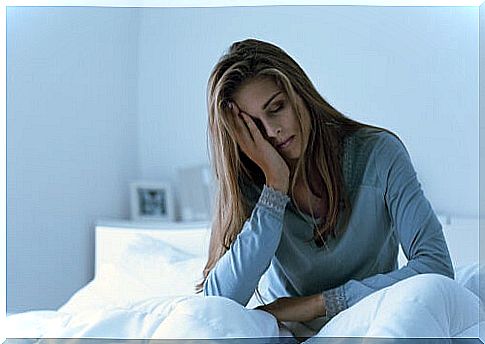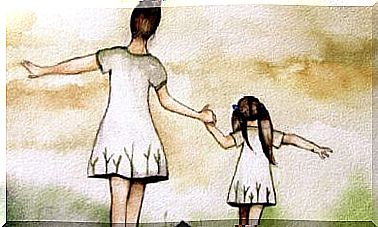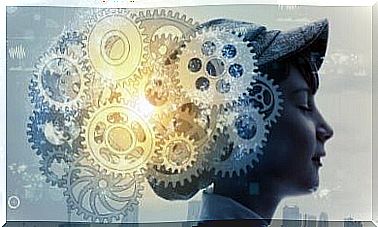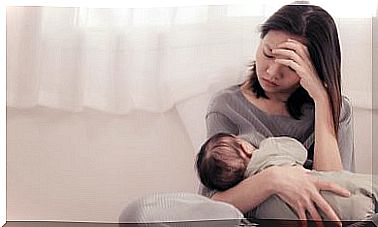What Are The Consequences Of Getting Little Sleep?

Sleeping little has become a habit for many teens and adults. In a world saturated by immediacy, stimulation and the lack of patience for waiting, there are basic needs, such as sleep, that have been altered in their satiety.
Likewise, the constant changes in working hours, the change in ambient light or access to technologies from anywhere has made this habit more pronounced.
The consequences of these changes manifest themselves on different levels, such as cognitive, emotional or biological. It has reached the point of creating new syndromes such as insufficient sleep. In the east, other care is prioritized before sleep.

Sleep process
Sleep is an essential physiological state. It implies a decrease in alertness and consciousness in order to develop processes of integration of brain activity and modify physiological processes in the body. It is governed by the circadian cycle, which alternates between a waking state and a sleeping state.
Likewise, it is important to indicate that there are two major stages of sleep that must always occur in the same order.
The first stage is Non-REM sleep, in which there are no rapid eye movements. This is subdivided into 4 phases:
- No MOR1 : sleep is light, the person can wake up easily and there is still perception of internal and external stimuli.
- No Mor 2 : sensory access block occurs in the body, lowers muscle tone and heart rate. Brain waves begin to slow down so the brain can gauge its activity.
- No Mor 3 : brain waves continue to decrease, the sensory block is greater, the production of growth hormones increases.
- No Mor 4 : along with the previous stage are the phases in which sleep is deepest. There is a predominance of delta waves.
Second is the REM sleep stage. Which is characterized by the presence of rapid eye movements.
In it, the muscle tone decreases and the respiratory and heart rhythms are irregular. It is the moment of sleep where the brain is most active and the most lucid dreams are produced with a common thread.
Brain activation and poor sleep
In brain imaging research, an overall reduction in brain activity has been found when sleeping time is reduced.
Even so, it has been specified that the greatest decrease in this activity is found in the prefrontal cortex and in the parietal lobe. This measurement has been done especially with verbal activities and is believed to be the consequence that the brain suffers from trying to stay awake and alert.
Does little sleep affect our cognitive functions?
Today, we know that sleep is essential to develop adequate daytime cognitive functioning.
Research has found that a decrease of 1.3 hours of sleep per day for one week causes a 32% decrease in alertness. This has repercussions on both physical and cognitive activities.
Memory and learning
Memory and learning are aspects related to a good sleep. It was found that, in the dream, the information that we acquire during the day is consolidated, which is why it is vital for learning.
For this reason, the decrease in the amount of daily sleep will affect these functions. Within the investigations we found that different aspects of memory are related to different phases of sleep.
For example, the consolidation and encoding of new information in memory depends on REM sleep and the Non-REM phase 2. Therefore, not being able to complete all these phases creates problems for the consolidation of memories. The effects can be transferred, for example, to academic performance.
Also, there is a relationship with learning new information. In this case, little sleep decreases the activity of the hippocampus, a vital structure for the coding of memory, being an obstacle also for the retention of information.
Attention
Similarly, poor sleep has been found to create daytime sleepiness that directly affects a person’s attention. In this case, the surveillance capacity decreases, which is why it tends to lose or omit relevant elements to carry out an activity.
Also, it is difficult for you to stay focused on the same activity for a long time. If you add to this an increase in your reaction time, you can create problems such as a traffic accident or the loss of an exam due to lack of time.
Reaction times
In the case of little sleep, reaction times tend to increase significantly. Also, the person is more prone to making mistakes when carrying out activities. Therefore, they need more time to complete it, and even then, they may have trouble solving it properly.
This affects multiple aspects of life, such as the academic part, since it can make them not understand or do not adequately perform what is asked of them. Also, problems can be observed in automatic activities such as driving a car, since it can react late in a daily situation.
Is the emotional sphere affected by sleeping little?
This is another significant aspect that is observed when we sleep little. Sleep deficit has been found to cause temporary mood swings, creating feelings of depression and anxiety in the person.
Similarly, poor sleep affects our emotional intelligence and constructive thinking. This has consequence in several factors, in the first place is the intrapersonal functioning. Little sleep decreases assertiveness, the sense of independence and personal updating.
The second place affects interpersonal functioning, in which empathy towards others and the quality of relationships are reduced. A specific decline has been seen in recognizing emotional gestures related to joy and anger. As a consequence, the relationship with others is significantly affected.
Lastly, there are problems with proper stress management. Therefore, the person shows difficulties in controlling some of the impulses in these situations. Also, there is a delay in the activation of the gratification system, which can increase the stress in the development of some situations.
Relationship of little sleep and physiological activities
Sleep is closely related to physiological activities, being vital to regulate our cognitive, emotional and physical activity. Among the main systems we find:
- Immune : the decrease in sleep weakens the immune system, forcing the organs in their activity and increasing the risk of contracting any disease.
- Cardiovascular : It has been found that people who have sleep problems have a higher risk of suffering from problems such as hypertension, heart disease or heart failure.
- Endocrine : sleeping little increases cortisol levels and lowers thyroid hormone. Therefore, there is a greater risk of suffering from obesity, diabetes and chronic fatigue.

Insufficient sleep syndrome
This is a disorder in which a person persistently does not get the quantity and quality of night’s sleep necessary to have a good alertness during the day. Its origin is not organic, but resides in external factors. Mainly, it is given by a voluntary restriction of sleep motivated by other interests than entering competition, such as having fun or working.
It usually occurs mainly in adolescents and young people of school age. In them a frequent daytime sleepiness is observed , a feeling of non-restorative sleep. Also, we see the need for external help in the morning so as not to get up too late: the mother or father waking up.
Among the factors that are related to this syndrome of little sleep are:
- Changes of adolescence.
- Electronics devices.
- Schedules and academic load.
- Use of stimulant substances.
- Emotional or stress factors.
conclusion
Finally, we must emphasize our need to sleep a number of hours. As we have seen, not doing so has negative emotional, cognitive and physical consequences. Therefore, sleep is essential for our performance on different levels, such as the physical and mental.
Therefore, it is important to think about the risks of getting little sleep. Thus, it is often preferable to prioritize sleep over other activities. In the long run, our bodies and the results of our efforts will thank you.









